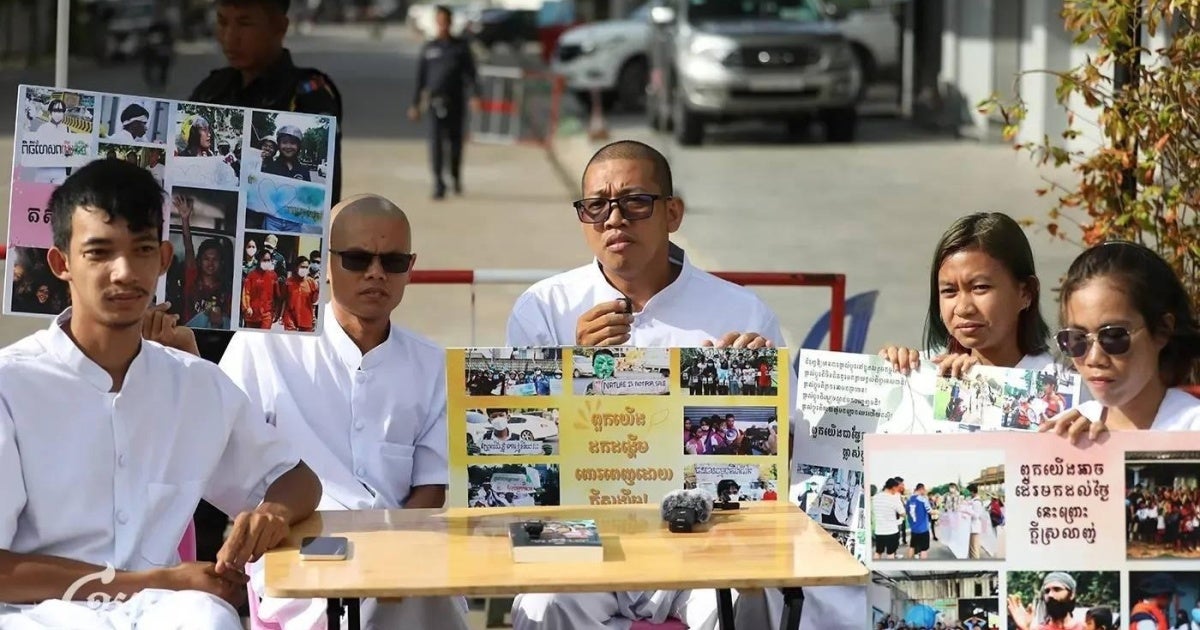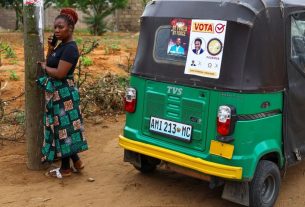(Bangkok) – The Cambodian authorities are trying 10 environmental activists on politically motivated charges to muzzle criticism of governmental policies, Human Rights Watch said today.
The trial in Phnom Penh of the members of Mother Nature, an award-winning, youth-led Cambodian environmental group, is expected to conclude on June 17, 2024, after nearly three weeks. On June 5, the authorities denied supporters of the group and some members of the media access to the public hearing, leading five of the charged activists to refuse to enter the court for the proceedings. If convicted of conspiracy, the defendants face up to 10 years in prison.
“Cambodian Prime Minister Hun Manet, like his father, Hun Sen, seems intent on jailing environmental activists instead of embracing their contribution to Cambodian society,” said Bryony Lau, deputy Asia director at Human Rights Watch. “Prosecuting these activists is harming them, the environment, and all Cambodians who are entitled to a clean, healthy, and sustainable environment.”
For more than a decade, Mother Nature has campaigned against environmentally destructive infrastructure projects, exposed corruption in the management of Cambodia’s natural resources, and mobilized young Cambodians to defend the country’s dwindling biodiversity. Cambodia has one of the world’s highest deforestation rates and high levels of wildlife trafficking. In recognition of their “fearless and engaging activism,” Mother Nature in 2023 received the prestigious Right Livelihood Award.
The authorities charged Yim Leanghy, Sun Ratha, and Alejandro Gonzalez-Davidson with lese majeste (insulting the monarchy) and conspiracy to commit an attack under articles 437-bis and 453 of the Criminal Code. Thun Ratha, Long Kunthea, Phuon Keoraksmey, Ly Chandaravuth, Binh Piseth, Rai Raksa, and Pork Khoeuy have also been charged with plotting a crime. Gonzalez-Davidson was deported from Cambodia in 2015 and remains banned from entering the country. Four others charged—Sun Ratha, Binh Piseth, Rai Raksa, and Pok Khoeuy—did not appear before the court.
Several of the group’s activists were previously imprisoned for their peaceful environmental activism. On June 16, 2021, the police arrested Sun Ratha, Ly Chandaravuth, and Seth Chhivlimeng in Phnom Penh, and Yim Leanghy in Kandal province for documenting the raw sewage flowing into the Tonle Sap River near the Royal Palace in Phnom Penh. Four days later, the court charged Ratha and Leanghy with lese majeste and conspiracy and Chandaravuth with conspiracy. Chhivlimeng was released without charge.
On May 5, 2021, the Phnom Penh court convicted Long Kunthea, Phuon Keoraksmey, and Thun Ratha of “incitement to commit a felony or disturb social order” under articles 494 and 495 of the penal code for peacefully protesting the government’s filling-in of Phnom Penh’s Boeung Tamok lake. The three spent more than 14 months in prison, with the charges they currently face being filed against them while they were serving this prior sentence.
Cambodian authorities have often previously charged human rights activists with incitement, which is punishable by two years in prison. In 2021, the then-United Nations special rapporteur on human rights in Cambodia expressed concern that “human rights defenders are currently in detention facing charges for incitement to commit felony … [w]hen civil society organisations engage in legitimate human rights advocacy, their voices should be heard and respected, not pilloried.” Charging activists with the more serious conspiracy charge threatens them with a much longer 10-year prison term.
One of the activists facing charges, Ly Chandaravuth, told Human Rights Watch the group’s actions posed no threat. “Our environmental activism is not a betrayal of our nation,” he said. “If the court has evidence proving us of plotting [a crime], broadcast the trial on national and international television so the people can see if the accusations are truly justified.”
On October 2, 2023, a Cambodian court barred the environmental activists Thun Ratha, Phuong Keoreaksmey, and Long Kunthea from traveling to Sweden to receive the prestigious Right Livelihood Award, also known as the “Alternative Nobel.”
“Cambodian authorities should stop using repressive laws and politicized courts to silence environmental defenders and other activists,” Lau said. “Development partners and others invested in protecting Cambodia’s environment should immediately call on the government to drop charges against these activists.”



